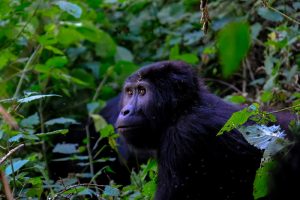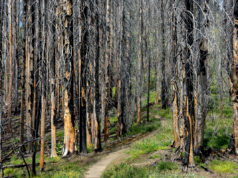Dear EarthTalk: I overheard someone saying the Coronavirus could drive mountain gorillas extinct? Is this because they are susceptible to the virus? — Spencer S., Tukwila, WA
While we don’t know for sure whether mountain gorillas or other great apes are susceptible to coronavirus, no one wants to find out. Damian Carrington reports in The Guardian that the coronavirus could potentially wipe out already threatened populations of chimpanzees, gorillas and orangutans — our closest living relatives with whom we share 98 percent of our DNA.
“Even pathogens producing mild symptoms in humans have been lethal to great apes in the past,” reports Carrington. “The fact that Covid-19 is fatal for some humans leads experts to fear it could potentially prove devastating to great apes.”
To date, no great apes are known to have contracted the coronavirus. Those humans who study and protect them would like to keep it that way. As a result, wildlife tourism across Africa is temporarily shut down. How long “temporary” may be is anybody’s guess at this point, but conservationists fear it could set back their efforts by decades if not put them “out of business”entirely.
“The suspension of ecotourism during the coronavirus pandemic has also meant the main source of revenue for gorilla conservation has been lost and there are fears some of those in surrounding communities who depend on tourists could turn to poaching out of desperation,” reports Jack Losh in The Guardian.
Meanwhile, the story is much the same all across Africa, where governments have suspended all tourism. Ann Gibbons reports for Science that researchers at wildlife reserves across Africa face new challenges in the age of coronavirus. The 130 wildlife rangers at Uganda’s Bwindi Impenetrable National Park are now briefed regularly on how to keep coronavirus away from gorillas and how to monitor wildlife for signs of the sickness.
At another Ugandan reserve, Taï and Kibale, researchers must quarantine for 14 days before they are allowed anywhere near the wild gorilla population under study there, And once researchers can get closer, they still must, in the words of Gibbons, “change their clothes and take their temperatures before they go into the forest, wear masks, and keep their distance.” Researchers there have also test chimps’ feces for COVID-19 and other viruses.
“Habitat loss and poaching are big threats to the survival of great apes, but viruses are also a concern,” adds Briggs. “Infectious disease is now listed among the top three threats to some great ape groups.” Indeed, past research has shown that chimps can contract the common cold virus, while Ebola is thought to be responsible for thousands of wild chip and gorilla deaths across Africa. Could coronavirus be the death knell for these and other iconic wildlife species?
CONTACTS: “Primatologists work to keep great apes safe from coronavirus,” sciencemag.org/news/2020/05/primatologists-work-keep-great-apes-safe-coronavirus; “Coronavirus poses lethal threat to great apes, experts warn,” theguardian.com/environment/2020/mar/24/coronavirus-poses-lethal-threat-to-great-apes-experts-warn.
EarthTalk® is produced by Roddy Scheer & Doug Moss for the 501(c)3 nonprofit EarthTalk. See more at https://emagazine.com. To donate, visit https://earthtalk.org.
Send questions to: question@earthtalk.org.








